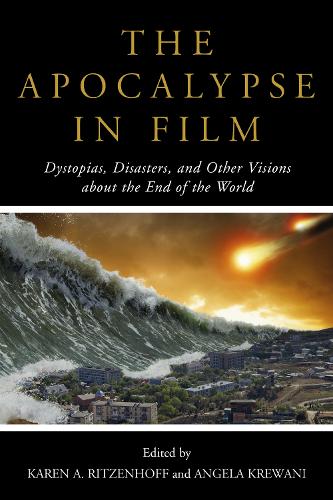
The Apocalypse in Film: Dystopias, Disasters, and Other Visions about the End of the World
(Hardback)
Publishing Details
The Apocalypse in Film: Dystopias, Disasters, and Other Visions about the End of the World
By (Author) Karen A. Ritzenhoff
Edited by Angela Krewani
Bloomsbury Publishing PLC
Rowman & Littlefield Publishers
30th December 2015
United States
Classifications
Tertiary Education
Non Fiction
Film history, theory or criticism
791.436556
Physical Properties
Hardback
254
Width 157mm, Height 239mm, Spine 24mm
531g
Description
We live in a world at risk. Dire predictions about our future or the demise of planet earth persist. Even fictional representations depict narratives of decay and the end of a commonly shared social reality. Along with recurring Hollywood blockbusters that imagine the end of the world, there has been a new wave of zombie features as well as independent films that offer various visions of the future. The Apocalypse in Film: Dystopias, Disasters, and Other Visions about the End of the World offers an overview of Armageddon in film from the silent era to the present. This collection of essays discusses how such films reflect social anxietiesones that are linked to economic, ecological, and cultural factors. Featuring a broad spectrum of international scholars specializing in different historical genres and methodologies, these essays look at a number of films, including the silent classic The Four Horsemen of the Apocalypse, the black comedy Dr. Strangelove or: How I Learned to Stop Worrying and Love the Bomb, the Mayan calendar disaster epic, 2012, and in particular, Lars Von Triers Melancholia, the focus of several essays. As some filmmakers translate the anxiety about a changing global climate and geo-political relations into visions of the apocalypse, others articulate worries about the planets future by depicting chemical warfare, environmental disasters, or human made destruction. This book analyzes the emergence of apocalyptic and dystopic narratives and explores the political and social situations on which these films are based. Contributing to the dialogue on dystopic culture in war and peace, The Apocalypse in Film will be of interest to scholars in film and media studies, border studies, gender studies, sociology, and political science.
Reviews
Ritzenhoff and Krewani introduce and present essays on the filmic and narrative representations of contemporary catastrophes, including television programs, digital media, and even action figures associated with those media. Since apocalypse can mean different thingsdestruction, devastation, disaster, revelationthe contributors of the 15 essays go in a variety of directions in exploring their subjects. Several essays treat Lars von Triers Melancholia (2011), an international art film that renewed critical interest in apocalyptic cinema. Other films covered include The Four Horsemen of the Apocalypse (Rex Ingram, 1921), Dr. Strangelove (Stanley Kubrick, 1964), and The Sacrifice (Andrei Tarkovsky, 1986). Also considered are zombies in Night of the Living Dead (George Romero, 1968) and The Walking Dead (Frank Darabont, 2010). An intriguing essay by Frederick Wasser shows how producer Irwin Allens disaster films (e.g., The Towering Inferno, 1974) were rendered obsolete by Steven Spielbergs Jaws (1975). This collection joins Kristen Moana Thompsons Apocalyptic Dread: American Film at the Turn of the Millennium (CH, Nov'07, 45-1383), another readable, exciting work on films about last things. Film stills are well chosen. Summing Up: Recommended. All readers. * CHOICE *
One whose interest in cinema transcends mere entertainment may find this collection of theories and analyses quite fascinating. * Free Kittens Movie Guide *
From the cruel winds of austerity to the savage songs of war and terror, the end of times proclamations surround us. Our cinema is filled with the rubble of catastrophe and our stories with the characters of nihilism and annihilation. In this incredibly timely and wonderfully structured collection on the apocalypse, chaos and catastrophe are examined across the history of film and through a remarkably interesting set of themes. From the war film to the science fiction spectacle, from the melancholia of dark dystopias to the hungriness of the zombie film, we see the world ending, and with it a present already dead and a future not yet born. Each chapter is filled with insightful textual and contextual analysis as the dead skin of past and present decompose and recompose before us. A must read and must have collection for those interested in the chaos within cinema. -- Sean Redmond, Deakin University
Using the depiction of human-made catastrophe in more than a century of apocalyptic film-making the authors of this first-rate, edited volume analyze political, social, racial, gender, religious, and ecological problems threatening the real worldoften in different ways than presented in movies. This book is an excellent example of contemporary scholars looking at popular culture, here motion pictures, as at times reflecting and more often disregarding reality. -- Brigitte Nacos, Columbia Univeristy
This collection of essays, edited by Karen A. Ritzenhoff and Angela Krewani, accounts for the omnipresence of the apocalypse in English-language cinema, a motif which represents a particularly potent allegory in our globalized world. I was very much impressed by the sheer novelty and range of the in-depth explorations the book offers. -- David Roche, Universit Toulouse - Jean Jaurs
Author Bio
Karen A. Ritzenhoff is professor in the Department of Communication at Central Connecticut State University and is also affiliated with the Women, Gender and Sexuality Studies Program. She is the co-editor of Screening the Dark Side of Love: From Euro-Horror to American Cinema (2012) and Selling Sex on Screen: From Weimar Cinema to Zombie Porn (Rowman & Littlefield, 2015). Angela Krewani is professor for Media Studies at Philipps University in Marburg, Germany. She is the co-editor of Hollywood Recent Developments (2005) and McLuhans Global Village Today (2014).
